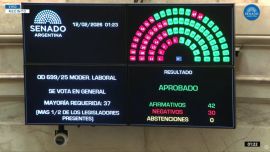Everything is relative, as Albert Einstein taught us over a century ago, and nothing is black and white, not even a black eye (with “no swelling of the eyelids and no subconjunctival haemorrhage” in those photos occupying centre stage in this month’s news, according to the expert opinion of an ophthalmologist reader of this column). A perspective which could be usefully applied to two other leading issues last week – the senatorial pay hike (in full retreat when this column was written but still awaiting a last word) and Congress rejection of the 12-digit SIDE intelligence booster.
Various comparisons would be in order before passing judgement on the senators – with their counterparts in the executive and judicial branches, with parliamentary colleagues in other countries or with their voters, among others – and beyond such quantitative comparisons, their salaries would still need to be gauged in terms of their productivity and institutional importance, not to mention other national priorities. But it might also be interesting to juxtapose the two separate issues under scrutiny here – the Senate pay increment and the SIDE bounty. Dividing the latter by the former, the reserved funds would suffice to pay 925 senators.
So what conclusions should be drawn there – that the senators are aspiring to an obscene wealth or that the SIDE booster is relatively modest by the standards of departmental budgets? Deep down the pockets of a multimillionaire are shallow when earning in Argentine pesos – even if ending up with the reviled nine million monthly pesos (gross) and measuring with the official exchange rate of a constantly appreciating peso, an Argentine senator would be earning an annual US$110,00 as against US$174,000 for their United States counterparts or US$157,000 in Brazil. Figures which need to be measured against the per capita incomes of their voters – US$12,812 here as against US$85,373 in the USA and US$11,352 in Brazil, according to the latest International Monetary Fund figures. A remuneration which should also be measured against the productivity of a chamber which last year took 100 days to hold its first session.
Turning to the SIDE booster, the sum has been made the issue when it should be the secrecy of the funds. Both sides are being obtuse here. The general opposition assumption seems to be that reverting to the old acronym of SIDE (Secretaría de Inteligencia de Estado) for the intelligence agency from the previous AFI (Agencia Federal de Inteligencia) is tantamount to reverting to SIDE’s bad habits of snooping on external adversaries and internal rivals. If that were indeed the purpose of the SIDE revival, the sum just rejected by the deputies would pay several hundred or a few thousand spies and trolls when the FBI employs over 35,000 people and the CIA as many as 400,000 directly or indirectly (an obviously hazy number as an occupational necessity).
But the new SIDE is a four-headed beast with different sections for domestic and international intelligence along with cybersecurity in line with modern times, all coordinated by a fourth section (which seems superfluous, shouldn’t SIDE chief Sergio Neiffert and his Señora 8 be doing that?). If pioneering a hitherto neglected cybersecurity is to be taken seriously, the booster of US$100 million or so looks pathetically inadequate when the world’s largest banks each spend an annual billion or more on it – alarmist forecasts have the costs already reaching over US$10 trillion by next year (more than the entire economy of any nation except the United States and China). The frustrated allocation barely scrapes a problem of these dimensions, not achieving more than job creation to keep some libertarian nerds and geeks in the country. In order to counter the image of the same old SIDE with the same old name, the government should have highlighted this innovation instead of fostering a paranoid secrecy which only breeds paranoia.
This multiplication of the shades of grey could be continued without whitewashing either the Senate pay hike or the SIDE booster – the gut reactions of President Javier Milei to the former, the opposition to the latter and public opinion to both are all valid enough. With destitution already hitting double digits last year even before Milei’s “no hay plata” austerity began, anything extra for intelligence looks autistic. The senators have the excuse of being the passive recipients of an automatic collective bargaining mechanism rather than actively greedy while high pay and/or previous wealth is supposed to safeguard against corruption in public office, an argument applied to preclude venal judges (not that the many critics of Supreme Court nominee Ariel Lijo this week would agree) but nine million pesos is way over the top when President Javier Milei’s gross salary is just over four million while deputies and Supreme Court justices clear six million and ambassadors around five million (with the return of income tax a major headache for the latter). Indeed, about the only person earning more than the above, including senators (apart from ex-president Cristina Fernández de Kirchner with her double privileged pension as a presidential widow), is, of all people, Alberto Fernández with a net pension of over 10 million pesos (which would nevertheless not go far as alimony in Madrid).
That fact alone goes to show that some major surgery is needed at all levels with pay showing the same disarray as relative prices. Yet beyond asking whether members of Congress are worthy of their hire is the entire future of representative institutions with the social networks returning democracy to its original Athenian model of the entire citizenry, the demos of the Agora, to whom populist leaders make a direct pitch. Superficial and simplistic though social network debate so often is, Congress generally fails to transcend it. As asserted at the start of this column, nothing is black and white but try convincing most people otherwise.






















Comments